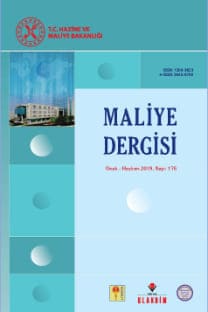Yükseköğretimin finansmanı ve finansman yöntemlerinin algılanan adalet düzeyi: Sakarya Üniversitesi paydaş görüşleri
Financing of higher education and the perception of fairness of different financing methods
___
Chapman, B. (2006), “Income Contingent Loans For Higher Education: International Reform”, Chap. 25, Handbook of the Economics of Education, Vol. 2, Edited by Eric A. Hanushek and Finis Welch.Ergen, Z. (2006), “Yükseköğretim Karma Malının Niteliği ve Finansmanı Üzerine”, Sosyo Ekonomi Dergisi, Sayı, 3, http://www.sosyoekonomi.hacettepe.edu.tr/ 060101.pdf (Erişim: Nisan, 2011)
Erik H. ve Welch, F. (ed.), (2006), "Handbook of the Economics of Education," Handbook of the Economics of Education, Elsevier, 1.
Johnstone, B. ve Marcucci, P. (2010) Financing Higher Education Worldwide, Who Pays? Who Should Pay? The John Hopkins University Press, Baltimore.
Kesik, A. (2003), Yükseköğrenimde Yeni Bir Finansman Modeli Önerisi: Bütünsel Model, Maliye Bakanlığı APK Kurulu Yayını, No:2003/362, Ankara.
Mutluer, K. (2008), Türkiye’de Yükseköğretimin Başlıca Sorunları ve Çözüm Önerileri, Maliye Bakanlığı Strateji Geliştirme Başkanlığı, Ankara.
Sarı, R. (2002), “Kazançlar ve Eğitim İlişkisi: İl Bazında Yeni Veri Tabanı ile Kanıt”, ODTÜ Gelişme Dergisi, No:29, 367-380.
Shaw, J. (2010), “Education a Bad Public Good?” The Independent Review, A Journal of Political Economy, Fall 2010, 15(2), http://www.independent.org/ publications/tir/article.asp?a=804 (Erişim: Nisan, 2011)
Some, T. (2006), Cost-Saharing in Francophone West Africa: Student Resistance and Institutional Stability at the University of Ouagadougou, Burkina Faso. PhD. Diss, Depatment of Educational Leadership and Policy, State University of New York at Buffalo.
Türkmen, F. (2009), Yükseköğretim Sistemi İçin Bir Finansman Modeli Önerisi, DPT, http://www.dpt.gov.tr/PortalDesign/PortalControls/WebIcerikGosterim.aspx?En c=83D5A6FF03C7B4FC430E757414592D37 (Erişim: Nisan, 2011)
Vedder, R. (2004), Going Broke by Degree: Why College Cost Too Much, Washington, DC.
YÖK (2007), Türkiye’nin Yükseköğretim Stratejisi, Ankara.
- ISSN: 1300-3623
- Yayın Aralığı: Yılda 2 Sayı
- Başlangıç: 1973
- Yayıncı: Hazine ve Maliye Bakanlığı
Ücret gelirleri üzerindeki vergi yükünün analizi
Etkinlik-eşitlik çelişkisi bağlamında yeniden dağıtım politikalarının sosyal refah üzerindeki etkisi
Doğrudan yabancı yatırımlar-istihdam ilişkisi: Türkiye örneği
Türkiye’de ikiz açık hipotezinin geçerliliği: Sınır testi yaklaşımı
SÜLEYMAN BOLAT, MURAT BELKE, Ozan ARAS
Devlet memuruna hediye rüşvet (mi)dir?
Maliye politikalarının keynesyen olmayan etkileri: Türkiye örneği
Vergi adaletine ulaşma yöntemleri çerçevesinde fayda ilkesinin teorik açıdan değerlendirilmesi
AHMET BURÇİN YERELİ, Ahmet Yılmaz ATA
Türkiye’de orta vadeli harcama sistemi uygulamasına ilişkin bir alan araştırması
